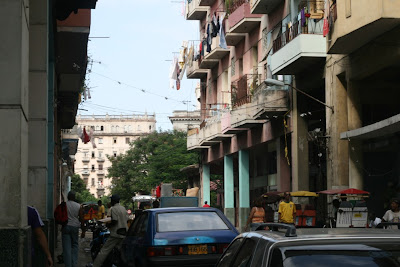Travel guides, blogs and forums all agree: choosing a casa particular over a hotel gives tourists the opportunity to see how Cubans live, it is a guarantee of getting to know real Cuba. Actually, this is just an opportunity to spend less money on accommodation and to get an idea of how some houses have been transformed in order to feed some more touristic illusions.
Our first casa in Havana was definitely the best one and they also served the best breakfast, which in Cuba is a major plus, as the food in casas is one of the few things that are edible without consequences (leaving aside the consequences of eating eggs for breakfast for one whole month, i.e. an average of 60 eggs/ person and cholesterol levels we decided not to measure, at least for a while).
 |
| Do we have enough room for all the stuff we carried with us? |
 |
| Coming up next: Brazilian telenovelas |
 |
| The room with the best Cuban soundtrack |
 |
| Guava is the new black |
 |
| Our bathroom in Havana - breaking the last barriers of privacy |
However, the main reason why we liked this casa was that in less than two days we befriended the right people and that's where the real fun began. We learned a lot about just how pushy Cuban guys can be and just how assertive we could be, we found out that you don't have to know somebody in order to like them, we partied in a club with house music located more or less at the end of the world and got there in a cab with the backseat covered in duct tape, paying for this a lot less than the normal fare and also understanding just how meaningful and special life insurance can be, we climbed up the roof and took some amazing photos of Havana, discovered the cheapest joints with the worst coffee and the best fried chicken, I improved my Spanish while Karolina was told she didn't really need any language in order to communicate, we almost got a ride back home in the police car and ended a party at the hospital at 2 a.m.
The other casa in Havana was the perfect example of how to squeeze money out of tourists without giving anything in exchange. One of the beds in our room broke when we sat on it, breakfast was a nightmare, we only had hot water in the morning and by night there was no water at all, except for the puddle on the floor where every morning we could admire the sight of wet, dead ants.
 |
| "Don't worry, we have many beds" |
 |
| Wet ants. Dead. |
And then there was the colonial house in Matanzas, so beautiful and spacious and welcoming we couldn't believe our eyes. It was safe, cozy and inspiring and after two very intense and crazy weeks in Havana we finally got a good dose of tranquility.
 |
| Patio in Matanzas |
 |
| Where the rooms have no keys. And don't need any. |
 |
| Script talks in Matanzas |
 |
| Addicted to Cubita |
The last stop before going back to Havana was Trinidad, where our casa did not differ much from a normal guesthouse anywhere else in the world and the interaction with real Cuban life was reduced to meeting our hosts - and they were Cubans.
 |
| Should have worn high heels to ring the doorbell |
 |
| Almost ready to leave Trinidad |
Going back to Havana was like going back home, to our old room and old habits. And on the last night, which deserves a post of its own, it turned out we were more at home and more adapted than we would have thought.

























